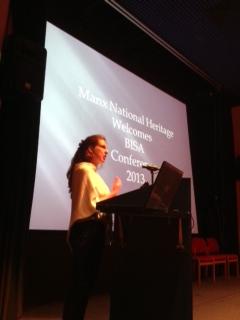
Many years ago, the local amateur operatic group I sang in had a Edwardian music hall show featuring the Florrie Forde number "Flanagan" which included the memorable lines “Flanagan, Flanagan, take me to the Isle of Man again”. A month after BISA's event in Douglas, that song is still a persistent little earworm!
BISA 2013 was generously hosted by Manx National Heritage at the Manx Museum in Douglas. BISA was pleased to hold an event for the first time both outside the UK and Republic of Ireland, Man being a self-governing British Crown Dependency.
In the Manx tongue, "Traa-dy-Liooar" ("Time enough") they say expresses the relaxed approach of Manx life, and so it was the rather extended Thursday evening BISA Committee meeting took place in a fine pub, The British Hotel, to which we returned over the next two days. Warmly welcomed by our hosts Paul Weatherall and Roland Ardern-Corris from Manx National Heritage, we sorted some BISA business and looked forward to a day an a half of archival action.
Events kicked off on Friday morning with welcoming words from Kirsty Neate of Manx Heritage (pictured) followed by Paul and Roland who gave a fascinating presentation on their experiences with planning, commissioning and delivering a digitisation programme. The preservation of recordings of the Manx language has been vital to the survival and study of that unique tongue. It’s true to say that Paul and Roly never stopped evangelising about their work – these are people with passion.
As the day’s programme unfolded, we saw the kind of variety we like at BISA: if it relates to the management, care, use and promotion of archival sounds, it’s our bag. Nor are we necessarily bound by our region – the next two speakers were Rainer Praschak of Mica Music Austria , and Jana Wedekind from OnMedia , an Austrian company with strong Scottish links. They spoke of how their services create an ‘eco-system’ where institutions can house their content, curate it, and manage the promotion of their collections through social media.
Archives tell stories. Tilly Blyth and Jen Kavanagh of the Science Museum were entertaining and informative on their project to develop the new Information Age gallery on communication technology. Collecting and using oral history for both research and for use in the gallery, they spoke with enormous enthusiasm on the value and some of the challenges, using examples from women Telephone Exchange operators and key figures in the emerging technologies and business of mobile phones in the 1980s.
From the specific focus of a new gallery, the post-lunch slots had a more strategic flavour. In the first of these, Adam Tovell of the British Library spoke with great clarity about the BL’s approach to ensure technical standards and processes combine with managing metadata to support access and delivery in response to user demands. Representing the Digital Repository of Ireland, Natalie Harrower told delegates of Ireland’s approach to establishing a trusted and secure digital repository service for digital collections of all kinds. The DRI project, which has still more than three years to run seeks to facilitate access to digital collections through a single access point and promote best practice in the management of digital collections. We hope to hear more of DRI’s progress at future BISA events. Another initiative we have been keeping an eye on at BISA is the one to establish a Scottish Sound Archive under the aegis of the National Library of Scotland. Alistair Bell, Project Manager, updated us with an overview of the approach, stakeholder engagement and the distributed national collection model. As in the DRI model, the Scottish Sound Archive seeks to enable a single search point to enable the discovery of many collections of Scottish content held in institutions across Scotland and, indeed, anywhere else.
The final, Saturday morning session took the form of a round-table discussion forum with the question posed "What’s stopping you digitising your archive?". Although Q&A’s had been a part of Friday’s sessions, the more informal Saturday gathering lead to some lively and interesting exchanges on common issues whilst new, and we trust, fruitful new contacts were forged. Standards for metadata and preservation file formats were discussed as well as approaches to risk analysis and constructing cases and arguments for parent organisations and funding bodies.
Afterwards some of us had time for a rewarding tour of the Manx Museum which does a great job of telling the Manx story and the history of Man’s relationships with its neighbours. Other delegates went to see the studios of Manx Radio .
On Saturday afternon, we left our hosts and headed off to our various flights back to the four corners of BISA’s lands and the daily concerns of our respective institutions. By the way, never refer to the "mainland" when talking to a Manx native I learned: as the word formed on my lips, I caught a look from Roland. Gently put right, off I went to catch my flight "across".
There be news shortly about next year's event in May 2014. We'll be working now to a more advanced timetable to ensure you have plenty of time to propose your contributions and plan your diary.
Archivally Yours,
Simon
